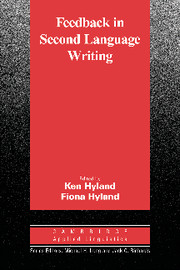Book contents
- Frontmatter
- Contents
- Contributors
- Series editors' preface
- Preface
- Chapter 1 Contexts and issues in feedback on L2 writing: An introduction
- I SITUATING FEEDBACK: SOCIOCULTURAL DIMENSIONS
- II SHAPING FEEDBACK: DELIVERY AND FOCUS DIMENSIONS
- III NEGOTIATING FEEDBACK: INTERPERSONAL AND INTERACTIONAL DIMENSIONS
- Chapter 10 Feedback and revision in second language writing: Contextual, teacher, and student variables
- Chapter 11 Interpersonal aspects of response: Constructing and interpreting teacher written feedback
- Chapter 12 Formative interaction in electronic written exchanges: Fostering feedback dialogue
- Chapter 13 Scaffolded feedback: Tutorial conversations with advanced L2 writers
- Chapter 14 “You cannot ignore”: L2 graduate students' response to discipline-based written feedback
- Author index
- Subject index
Chapter 13 - Scaffolded feedback: Tutorial conversations with advanced L2 writers
Published online by Cambridge University Press: 05 October 2012
- Frontmatter
- Contents
- Contributors
- Series editors' preface
- Preface
- Chapter 1 Contexts and issues in feedback on L2 writing: An introduction
- I SITUATING FEEDBACK: SOCIOCULTURAL DIMENSIONS
- II SHAPING FEEDBACK: DELIVERY AND FOCUS DIMENSIONS
- III NEGOTIATING FEEDBACK: INTERPERSONAL AND INTERACTIONAL DIMENSIONS
- Chapter 10 Feedback and revision in second language writing: Contextual, teacher, and student variables
- Chapter 11 Interpersonal aspects of response: Constructing and interpreting teacher written feedback
- Chapter 12 Formative interaction in electronic written exchanges: Fostering feedback dialogue
- Chapter 13 Scaffolded feedback: Tutorial conversations with advanced L2 writers
- Chapter 14 “You cannot ignore”: L2 graduate students' response to discipline-based written feedback
- Author index
- Subject index
Summary
As research in developmental literacy and biliteracy moves forward, a recognition of the influence of oral language on learners' writing development has become widespread. Those who espouse a dialogic view of writing, and of teaching writing, assign a central role to social conversation in the planning, production, and revision of written texts (Bruffee, 1995;Wells, 1990). Indeed, some within this school of thought posit oral language as the point of origin for all literacy activities (Barnes, 1990; Dickinson et al., 1993; Kroll, 1981; Shuy, 1987).
According to this view, oral discourse provides us with the ideas we write about, the rhetorical modes we use to frame those ideas, and the voice that gives our writing its individual character. Even the words and expressions that find their way into our written texts ultimately derive from conversations we have had with others (see Gillam's 1991 and Herdman's 1997 discussions of Bakhtin's views of writing), and internally with ourselves (seeWertsch's 1991 treatment of Vygotsky's sociocultural theory of cognitive development, particularly his notion of inner speech).
To what extent this view of writing is valid for second language (L2) writers is open to question (Weissberg, 2000). Nevertheless, current theory and practice in L2 writing pedagogy depends to a large extent on social interaction in the form of conversational activities in the writing classroom. Oral brainstorming (Blanton, 1992), collaborative composing (Hirvela, 1999), and peer revision groups (see Williams's 2002 review) are just three examples of the deliberate use of oral language in L2 writing instruction.
- Type
- Chapter
- Information
- Feedback in Second Language WritingContexts and Issues, pp. 246 - 265Publisher: Cambridge University PressPrint publication year: 2006
- 9
- Cited by



